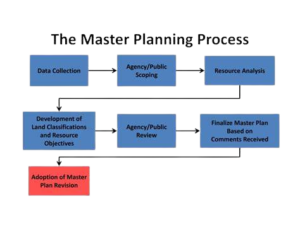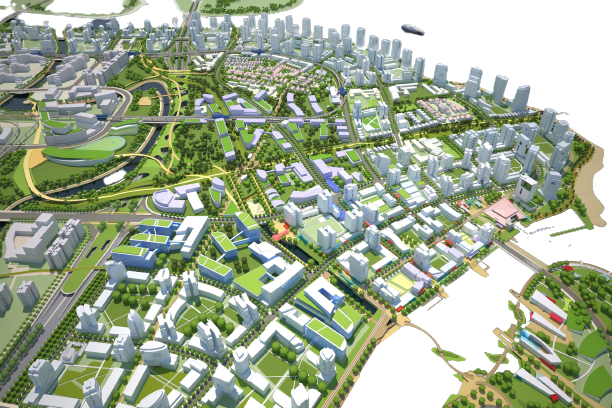Definitions
A Master Plan is an evolving long term perspective plan document which is a guide to the sustainable and planned development of an organization, a town or a city. The plan document entails planning guidelines, policies, spatial needs and development plans for various socio-economic activities such as housing, transportation, community facilities etc. that support the population.
A master plan is a blueprint for the future growth of any organization and must be directly tied to the core business goals and planning. It will identify economic and other factors such as utility infrastructure development, planning, acquisition and sustainability.
A Master plan is a type of a plan that pertains to the physical development of a city, town or municipality over the long term that ranges between 10 to 15 years into the future. It is intended to guide a community’s growth from a high-level perspective, focusing on:
- Building and preserving a locality’s unique character
- Diversity
- Investment
- Desired change
- Enhance livability of a community
Note: Master plans are aspirational i.e., they imagine what’s possible and propose a direction to achieve those goals. But that doesn’t mean they are permanent. Circumstances may change as time goes on, and plans may need to be adjusted accordingly.
Importance of a master plan
The approach of a master plan provides the foundation for:
- The long-term investment plans
- The development of physical assets
- The evaluation of regulations, including zoning standards
- The identification of areas in need of utility development or extensions
- The acquisition and development of future facility sites
- The incorporation of environmental conservation and sustainability features
- The prioritization of overall needs
Process of preparing a master plan
- Public participation: ask the public about their vision and questions that will prompt them to reflect on the town’s character as well as their thoughts on the future. The goal of this step is to create community-supported vision statements, goals, and objectives that will help guide the development of your master plan.

- Relevant data collection and analysis: gather data that is likely to influence the priorities and projects identified in the master plan. this step enables you to understand the current state and identify possible future conditions that might drive the need for specific changes.
- Identify alternatives: by employing what you have learnt about current state, future projections, land maps, and community input, consider a variety of development scenarios
- Narrow down alternatives: Compare the advantages and disadvantages of each alternative, and how you can best use your current land and resources to encourage your preferred type of growth. Note that to eliminate options, you may need to develop a set of criteria to measure each scenario against.
- Prepare a strategy of moving forward: Once a development scenario is decided, form a strategy as to how, when, and by whom the recommendations of the plan should be implemented. As board and committee members in all functional areas consider proposed projects in the months and years ahead, how will you ensure that development aligns with goals and drives progress forward in the intended way?
- Manage and track project/program performance: monitor the plan’s progress over time to make sure it is heading in the right direction.
Elements of a master plan
- Goals and policies: these are the desires and wishes about what kind of place it wants to be and how it wants to improve its quality of life.
- land use: Looks at the pattern of land use.
- housing: considers the pattern of residential development in determining what types of housing stock is needed and where it might best be constructed in the future as well as assessing the locality how future market forces may influence the development and affordability of housing
- Economic development: determines the strengths and weaknesses of the labor force and market sectors in the local economy in planning for new business and development.
- natural resources: identifies land, water, cultural and historic resources whose preservation is important in maintaining natural resources and the character.
- open space and recreation: assess the future recreational needs in planning for the maintenance and expansion of existing areas, and the construction of new facilities
- services and facilities
- transportation and circulation
- implementation
Recommendations
The process of preparing a master plan requires to involve professional experts such as Planners, architects and Surveyors with experience in this area.
In case you find the article useful and would like to support me, you can buy me a coffee ☕



